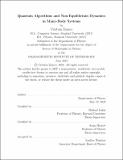Quantum Algorithms and Non-Equilibrium Dynamics in Many-Body Systems
Author(s)
Zanoci, Cristian
DownloadThesis PDF (14.19Mb)
Advisor
Lukin, Mikhail
Harrow, Aram
Terms of use
Metadata
Show full item recordAbstract
Understanding the physical features of quantum many-body systems is a challenging endeavor spanning across multiple branches of physics. In this thesis, we explore the properties of one- and two-dimensional quantum systems in the context of quantum algorithms and non-equilibrium dynamics.
In the first part, we construct quantum algorithms that sample from classical Gibbs distributions. More specifically, a quantum state can encode the entire probability distribution, such that a measurement in the computational basis yields an unbiased sample. We show that in the case of Ising models, such states can be prepared in a time that scales quadratically with the linear system size. The state preparation is based on adiabatic evolution under a local quantum Hamiltonian. This approach achieves a polynomial speedup over classical local Markov chain algorithms. By exploring the physical origin of this speedup, we connect the quantum phases of the Hamiltonian governing the adiabatic evolution to the complexity of the sampling problem. Moreover, we show that some of these phases exhibit unusual characteristics, such as robust exponentially degenerate ground states and fracton excitations with restricted mobility. We relate these properties to the subsystem symmetries of the quantum Hamiltonian.
In the second part, we develop an open system framework for studying the thermalization and transport properties of systems coupled to external baths. We first identify the conditions under which they can be cooled to low temperatures. Next, we use the baths to impose temperature and chemical potential gradients across the system and study the emergent steady states. In particular, we are interested in the temperature-dependence of the transport coefficients. Furthermore, we find exact analytical solutions for these quantities in a class of Sachdev-Ye-Kitaev models, which provide additional insights about the non-equilibrium dynamics at late times. Finally, we establish a relationship between diffusion and quantum chaos by showing that the diffusivities are upper bounded by the chaos propagation rate at all temperatures.
Date issued
2023-06Department
Massachusetts Institute of Technology. Department of PhysicsPublisher
Massachusetts Institute of Technology